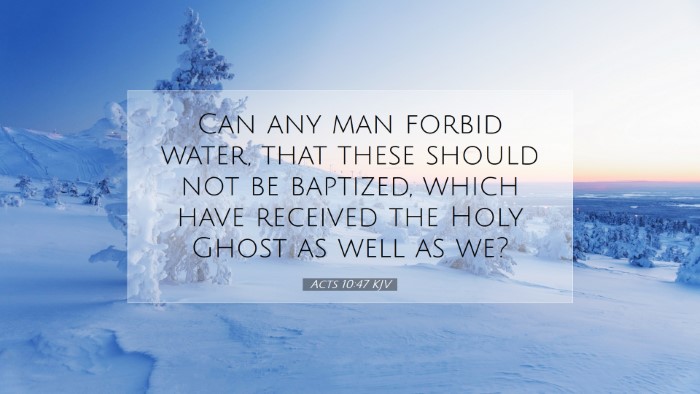Commentary on Acts 10:47
Acts 10:47 states: "Can any man forbid water, that these should not be baptized, which have received the Holy Ghost as well as we?" This pivotal verse occurs in the context of Peter’s vision and the subsequent conversion of Cornelius, a Gentile, and his household. It marks a significant moment in the early church, heralding the acceptance of Gentiles into the Christian faith, a theme that reverberates throughout the Book of Acts.
Contextual Overview
The preceding verses outline a transformative event in which Peter is led by the Holy Spirit to the house of Cornelius. This encounter breaks both cultural and religious barriers, as Cornelius, being a Roman centurion, represents an ethnic group previously considered outside the covenant community of Israel. His conversion poses fundamental questions about the nature of salvation and the inclusiveness of the Gospel.
Significance of Baptism
Baptism, as emphasized in this verse, serves as a public declaration of faith. The early church viewed baptism not merely as a ritual but as a critical act associated with entry into the community of believers. The fact that Cornelius and his household received the Holy Spirit before baptism underscores the theological principle that the work of the Holy Spirit is not confined to human rituals but transcends them.
Theological Insights
- God's Sovereignty: The episode highlights God’s initiative in salvation. According to Matthew Henry, it exemplifies that God often acts beyond human parameters, choosing whom He will bless and save. This challenges believers to embrace a broader understanding of God's grace.
- Universal Offer of Salvation: Albert Barnes comments on the implications of this passage regarding the universality of the Gospel. The question posed by Peter indicates that the gift of the Holy Spirit is available to all, irrespective of their ethnic or social background.
- Integrity of Faith Experience: Adam Clarke notes that the reception of the Holy Spirit before baptism demonstrates the priority of personal faith experience over ritual compliance. This aspect has serious implications for understanding the relationship between faith, works, and the means of grace.
Pastoral Applications
For pastors and church leaders, this passage calls for a reassessment of how inclusion and acceptance are reflected within the church community. The early church’s acceptance of a Gentile family challenges congregations today to embrace diversity and promote unity in the Body of Christ regardless of differences in background.
Embracing Diversity
The early acceptance of Cornelius stands as a model for contemporary congregations to consider their approach to racial, cultural, and social diversity within their communities. Matthew Henry encourages church leaders to welcome and integrate those from all walks of life, reinforcing that the church is built upon the foundation of Christ for all humanity.
Understanding the Role of the Holy Spirit
This passage also emphasizes the importance of the Holy Spirit’s role in conversion and community. Albert Barnes points out that the presence of the Holy Spirit is the true validation of one's faith, serving as evidence of God's work within believers. Pastoral ministries should focus on fostering an environment where the Holy Spirit can move freely among believers.
Further Reflections
As scholars contemplate the implications of Acts 10:47, several themes emerge that merit further study:
- The Nature of Initiation: What does it mean to be initiated into the Christian faith? How does baptism relate to the experience of receiving the Holy Spirit in modern contexts?
- Human Obstruction vs. Divine Will: The phrase "Can any man forbid water" prompts discussions on how human traditions and prejudices may impede God’s purpose. The church must critically examine its own barriers that may prevent the spreading of the Gospel.
Conclusion
Acts 10:47 is a profound reflection on the nature of faith, the movement of the Holy Spirit, and the inclusivity of the Gospel. By combining insights from Matthew Henry, Albert Barnes, and Adam Clarke, it becomes evident that this text not only calls the church to embrace diversity but also emphasizes the primacy of personal faith experiences in the light of divine grace. As you continue to explore this passage, may the truths contained within encourage a deeper commitment to God’s mission of reconciliation and acceptance.


